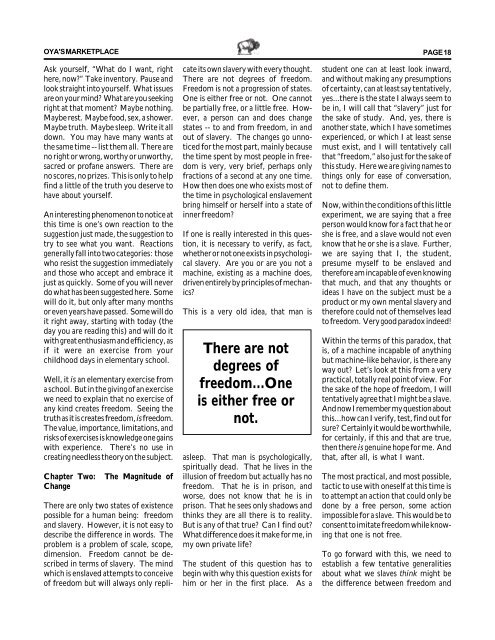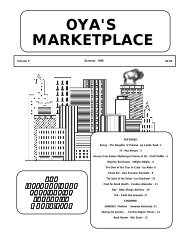OYA'S MARKETPLACE - Oya N'Soro
OYA'S MARKETPLACE - Oya N'Soro
OYA'S MARKETPLACE - Oya N'Soro
You also want an ePaper? Increase the reach of your titles
YUMPU automatically turns print PDFs into web optimized ePapers that Google loves.
<strong>OYA'S</strong> <strong>MARKETPLACE</strong> PAGE 18<br />
Ask yourself, “What do I want, right<br />
here, now?” Take inventory. Pause and<br />
look straight into yourself. What issues<br />
are on your mind? What are you seeking<br />
right at that moment? Maybe nothing.<br />
Maybe rest. Maybe food, sex, a shower.<br />
Maybe truth. Maybe sleep. Write it all<br />
down. You may have many wants at<br />
the same time -- list them all. There are<br />
no right or wrong, worthy or unworthy,<br />
sacred or profane answers. There are<br />
no scores, no prizes. This is only to help<br />
find a little of the truth you deserve to<br />
have about yourself.<br />
An interesting phenomenon to notice at<br />
this time is one’s own reaction to the<br />
suggestion just made, the suggestion to<br />
try to see what you want. Reactions<br />
generally fall into two categories: those<br />
who resist the suggestion immediately<br />
and those who accept and embrace it<br />
just as quickly. Some of you will never<br />
do what has been suggested here. Some<br />
will do it, but only after many months<br />
or even years have passed. Some will do<br />
it right away, starting with today (the<br />
day you are reading this) and will do it<br />
with great enthusiasm and efficiency, as<br />
if it were an exercise from your<br />
childhood days in elementary school.<br />
Well, it is an elementary exercise from<br />
a school. But in the giving of an exercise<br />
we need to explain that no exercise of<br />
any kind creates freedom. Seeing the<br />
truth as it is creates freedom, is freedom.<br />
The value, importance, limitations, and<br />
risks of exercises is knowledge one gains<br />
with experience. There’s no use in<br />
creating needless theory on the subject.<br />
Chapter Two: The Magnitude of<br />
Change<br />
There are only two states of existence<br />
possible for a human being: freedom<br />
and slavery. However, it is not easy to<br />
describe the difference in words. The<br />
problem is a problem of scale, scope,<br />
dimension. Freedom cannot be described<br />
in terms of slavery. The mind<br />
which is enslaved attempts to conceive<br />
of freedom but will always only repli-<br />
cate its own slavery with every thought.<br />
There are not degrees of freedom.<br />
Freedom is not a progression of states.<br />
One is either free or not. One cannot<br />
be partially free, or a little free. However,<br />
a person can and does change<br />
states -- to and from freedom, in and<br />
out of slavery. The changes go unnoticed<br />
for the most part, mainly because<br />
the time spent by most people in freedom<br />
is very, very brief, perhaps only<br />
fractions of a second at any one time.<br />
How then does one who exists most of<br />
the time in psychological enslavement<br />
bring himself or herself into a state of<br />
inner freedom?<br />
If one is really interested in this question,<br />
it is necessary to verify, as fact,<br />
whether or not one exists in psychological<br />
slavery. Are you or are you not a<br />
machine, existing as a machine does,<br />
driven entirely by principles of mechanics?<br />
This is a very old idea, that man is<br />
There are not<br />
degrees of<br />
freedom...One<br />
is either free or<br />
not.<br />
asleep. That man is psychologically,<br />
spiritually dead. That he lives in the<br />
illusion of freedom but actually has no<br />
freedom. That he is in prison, and<br />
worse, does not know that he is in<br />
prison. That he sees only shadows and<br />
thinks they are all there is to reality.<br />
But is any of that true? Can I find out?<br />
What difference does it make for me, in<br />
my own private life?<br />
The student of this question has to<br />
begin with why this question exists for<br />
him or her in the first place. As a<br />
student one can at least look inward,<br />
and without making any presumptions<br />
of certainty, can at least say tentatively,<br />
yes...there is the state I always seem to<br />
be in, I will call that “slavery” just for<br />
the sake of study. And, yes, there is<br />
another state, which I have sometimes<br />
experienced, or which I at least sense<br />
must exist, and I will tentatively call<br />
that “freedom,” also just for the sake of<br />
this study. Here we are giving names to<br />
things only for ease of conversation,<br />
not to define them.<br />
Now, within the conditions of this little<br />
experiment, we are saying that a free<br />
person would know for a fact that he or<br />
she is free, and a slave would not even<br />
know that he or she is a slave. Further,<br />
we are saying that I, the student,<br />
presume myself to be enslaved and<br />
therefore am incapable of even knowing<br />
that much, and that any thoughts or<br />
ideas I have on the subject must be a<br />
product or my own mental slavery and<br />
therefore could not of themselves lead<br />
to freedom. Very good paradox indeed!<br />
Within the terms of this paradox, that<br />
is, of a machine incapable of anything<br />
but machine-like behavior, is there any<br />
way out? Let’s look at this from a very<br />
practical, totally real point of view. For<br />
the sake of the hope of freedom, I will<br />
tentatively agree that I might be a slave.<br />
And now I remember my question about<br />
this...how can I verify, test, find out for<br />
sure? Certainly it would be worthwhile,<br />
for certainly, if this and that are true,<br />
then there is genuine hope for me. And<br />
that, after all, is what I want.<br />
The most practical, and most possible,<br />
tactic to use with oneself at this time is<br />
to attempt an action that could only be<br />
done by a free person, some action<br />
impossible for a slave. This would be to<br />
consent to imitate freedom while knowing<br />
that one is not free.<br />
To go forward with this, we need to<br />
establish a few tentative generalities<br />
about what we slaves think might be<br />
the difference between freedom and



